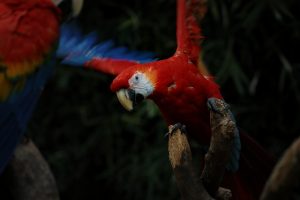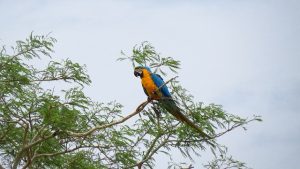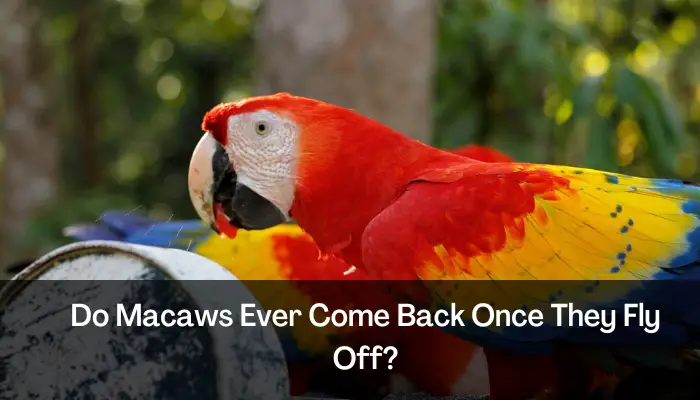The answer is “Yes”, in the event that a parrot flies away, it will eventually return. This is due to the inherent requirement they have for social interaction. The reason is that they are social creatures to begin with and therefore require companionship.
Since they never were trained how to do it, caged birds are typically unable to obtain food in the wild. They will eventually grow hungry and look for food in locations they are familiar with, like their former cage.
Many of them will come back inside their cage as soon as they discover if it has been placed outside. If they can find them, some pets will even fly to their owners.
Macaws won’t know how their home from above, though. Before their escape, they had never seen it. However, unless their cage is outdoors, they typically struggle to find their home.
The bird may try to return to its original location in these situations, but it will be completely unfamiliar with its surroundings. Birds have been known to choose a person at random if they determine what any human will do. You might get a call if someone has reported your bird missing.
Do Pet Macaws Fly Away?

This is a typical misunderstanding. Many people presume that because they have seen macaws outside strolling on their human’s arm, they won’t take flight. This is untrue, though. Many birds will take flight if given a chance, even if it’s just for a moment.
Many birds kept in captivity have their flying feathers removed. The bird needs these feathers to have a powerful flight. Lacking them, these macaws can only glide and typically cannot soar very high. Since these feathers do regrow, wing cutting must be done frequently.
A captive bird’s wings have most certainly been clipped if you notice it, just not flying away. When they develop their flight feathers, most caged birds have their wings cut, so they rarely try to fly. They firmly believe they cannot.
The practice of “wing clipping” is controversial. Some say that it is necessary to prevent the bird from escaping into the wild, while others claim it is cruel to do so. If you are considering having your bird’s wings clipped, you should discuss the matter with your vet first.
Can Macaws Find their Way Back Home?
Macaws do occasionally return home on their own. A pet parrot’s inability to recognize the exterior of its home is the biggest barrier to them returning there as they have lived within the house its entire life.
To find their house, macaws can instead refer to other landmarks. Many macaws will know their owners by sight and sound, for instance, if they are talking outside. It is advised to spend as much time outside if your parrot escapes because it can be one of the few opportunities for them to locate you.
It is frequently advised that you also move their cage outside. Macaws are aware of both the physical characteristics of their cage and the fact that it holds food. Your macaw will probably start hunting for its cage when it becomes hungry. To entice the bird back, be sure to maintain the cage stocked with tasty treats and food.
Macaws are more inclined to fly home than most birds since they are sociable animals. But whether they can discover it is typically the problem. A lot of them will attempt to fly back home, but that doesn’t guarantee that they’ll be successful. Due to their powerful wings, parrots may frequently fly great distances from their homes.
Why do Macaws Fly Away?
Every time they see an open window or door, birds frequently want to flee, as any owner of birds will definitely agree with. This could have various causes. Macaws are curious animals. They might try to check something out if they see something intriguing and novel.
In addition, parrots are social creatures. They may wish to see birds if they notice them flying around outside.
Also, when they are terrified, they may try to fly out of windows and doors. They can be more prone to flee through an exit if something inside the house terrifies them.
How Far Can They Fly From Home?

When a bird first flees its home, it usually has one of two reactions. They will either fly around erratically as a result of excitement or fear, or they will freeze and barely move. If your macaw barely moves, he or she will usually not fly very far. These macaws are usually found in nearby trees or perches.
However, macaws that learn to fly can travel for miles before settling down and resting. Some birds have been found up to 50 miles away. After fleeing, many macaws are pursued by wild birds, causing them to fly further and further away from home.
Parrots rarely recall their way back in these situations. They’ve never gone outside and don’t have an idea about the appearance of their home. These reasons make relocating their residence tough for them.
There is a slim chance that your macaw will find its way back to you if it has flown a great distance away. After all, a macaw that just flew one mile away has a much better chance of flying back over their home and seeing its owner than a macaw that flew fifty miles away does.
We strongly advise getting in touch with pet shops, shelters, and other organizations of a similar nature up to 70 miles away. When you set your bird free into the world, you have no way of knowing where it will end up.
Do Macaws Remember Their Owners?
Macaws, like humans, are sociable birds that have a strong capacity for memory. These parrots, in particular their owners, tend to recall everyone they’ve ever spent any significant amount of time with. It’s true even for long-lost parrots. If they haven’t seen their owner in a while, and they happen to spot them nearby, they may decide to go back home.
As a result, if you find your runaway macaw on a tree and they totally ignore you, it’s not because they’ve forgotten about you. These birds don’t know how to fly down in many circumstances. While this may appear to be a simple task, many birds grown in captivity have difficulty getting down from trees. Some of them become stuck and must muster a tremendous deal of confidence before they can go.
Conclusion
Parrots frequently make an effort to return if they have escaped. As sociable animals, the majority will miss having company. They will naturally look for familiar faces and bird species, which typically entails returning home. Additionally, the majority of captive parrots are unable to locate foods in the wild. As a result, they can decide quickly that going back to their cage will satisfy their hunger.
The majority of parrots will try to fly back, but some may not succeed. If they have traveled far by air, this is especially true. Given their high rate of flight—up to 30 miles per day—parrots frequently find themselves far from their place of origin.
Your parrot’s chances of returning home decrease as they fly farther away.
You can assist them by positioning familiar landmarks outside, like their cage. Additionally, we advise owners to spend time outdoors. Many birds won’t be able to identify their home from above, but they might be able to identify their person by sound and sight.

Hi, I’m Regina Rios. Just another bird lover who loves to share knowledge from personal experience. I’ve grown up with pet birds since childhood as my mommy also loves birds. As I can’t pet many birds in open air in my house as my mom does; I created my first bird cage on my rooftop using wood, copper wire, and a metal shed in 2018 and start collecting pet birds. Now, I have so many pet birds such as Macaws, Parrot, Cockatiel, Parakeet, and others. Not only that, if I see natural birds are injured I keep them in my house until they get well. Now, my hobby becomes my income source as my home birds have babies and I sell them to birds lover like mine. I’ve created this blog to inspire others bird owners by sharing my personal knowledge. Good Luck!


